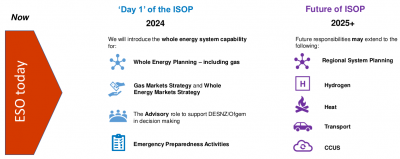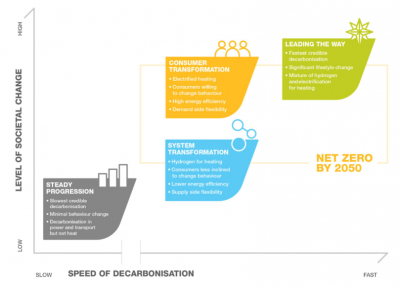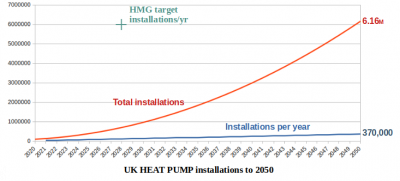It is only when one looks at the big picture does one become aware of how immense the size of the problem. It is not just a matter of being able to meet peak demand, it is also a matter of meeting demand throughout the whole day.
At the moment, as you state, there is sufficient generating capacity to comfortably meet peak demand, provided that it is available. But as the country transitions from controllable generating capacity to uncontrollable generating capacity, the above situation could quickly reverse.
According to NG data, demand today has varied from 24GW to a peak of 40GW, which being generous averages to 32GW, but don't forget that is for each of the 24 hours in the day, which gives a grand total of 768GWh of electrical energy consumption.
Whilst I am not against battery storage and plan to install some myself in the not too distant future, it must be remembered that this is storage and not generation, and it is not 100% efficient. Installing 14kWh of battery storage in 3 million homes, would probably provide in the order of 36GWh of available electrical generation, assuming all the batteries have been charged to capacity. It would not have reduced the 768GWh of electricity demand today, but merely provided the ability to reduced the peak.
We are in the ridiculous situation where NG are not allowed to have any large scale battery storage, because it is deemed to be generation, yet is expected to control supply to meet demand, from a supply system which is increasingly becoming unreliable.
From which source will the power come, when there is little wind or solar, even after the proposed 280GW of capacity has been installed?
All this before all the EV's, heat pumps and battery storage have been connected.
My friend who works for NG, told me about this 'empty suit' in NG higher management, who is supposedly a Chartered Electrical Engineer, but was asking why they did not use AC batteries.
I am worried for the future of my kids and grand-kids.
Two points @derek-m
Firstly, I was indeed putting forward a scenario which was aimed specifically at reducing the peak.
In communications I'm having with National Grid, that is the main driver which requires the massive infrastructure upgrades.
There's plenty of available capacity if Demand was spread more evenly.
Secondly, I have been deliberately provocative by sneaking in the words "off grid" in my suggestion.
That stored charge would supply only the host house, rather than be capable of re-export.
I've suggested a strategy which would cost less than the Great Grid Upgrade, whilst simultaneously lifting those in Social Housing out of poverty.
We're fighting against an Energy Crisis, with the aim of overcoming Climate Change.
This is a lot bigger than "which policy allows energy companies to make the most profit?"!
Save energy... recycle electrons!
Maybe the energy industry should be nationalised, that should prevent the companies from making excessive profits.
Posted by: @transparentThey're a commercial company.
It's to their benefit to have an oversized UK grid
Are they being paid through some sort of Regulated Asset Base scheme? The higher the value of assets under ownership the more they can charge the public, right?
This is why an alternative to each house using a heat pump starts to look interesting. Heat networks, initially unabated combustion powered (gas, biomass, energy-from-waste or landfill) and later something more sustainable (deep geothermal, cogeneration, CCS) start to look like something which could flatten the investment curves both in the grid investment and intermittent generation.
I hope that the grid upgrade does not suffer from unclear scope, vague promises, poor management or the like; it would be quite unfortunate for something we the public are liable for to not deliver the end result we want.
It's not an Asset Base scheme.
NGET do, however, receive income for Transmission Network Use of System charges (TNUoS).
The more electricity passes through the 275kV/400kV grid, their income has the potential to rise...
... but only if they also meet the criteria agreed with Ofgem in the current RIIO contract.
If NGET handle so much electricity that they are able to export a substantial portion of that through our European Interconnectors, then they would expect their income to increase.
What I'm less certain of is how that can benefit the UK-based consumers whose higher-charges will have funded the 5x expansion of the Transmission Grid in the first place. 🤔
Posted by: @derek-mMaybe the energy industry should be nationalised
A decision has already been made by Ofgem to create a Future Systems Operator which will replace the role presently fulfilled by the private/commercial company National Grid ESO (Electricity Systems Operator).
The most recent proposal is to form a body called the Independent System Operator and Planner (ISOP).
Unlike NG-ESO, ISOP's remit will cover all energy strategy and operation within the UK:
If/when Ofgem implement the ISOP proposal, then it would embrace not only electricity and gas, but also @chickenbig's favoured heat networks, and even transport.
I cannot yet tell how far progress has been made along that road because the presentation from which the above diagram derives didn't mention the Department of Transport or its Secretary of State, Mark Harper MP (Swindon). He may yet be surprised to see that some of his Department's responsibilities are being acquired by Ofgem!
You will realise that the explanation above would leave ISOP democratically unaccountable.
Ofgem and National Grid have recognised that as being an important issue.
So there will also be the formation of Regional Strategic Energy Planners (RESPs). They will be accountable to the Councils within the region, to which we elect members of our local community every four years.
The RESP proposal is still being shaped, and Local Authorities have a route through which they are being asked to respond.
I too will be submitting my observations because I have Stakeholder status with National Grid.
Please remember that National Grid and their Pathway to Net Zero Team can read this topic!
At some point very soon Ofgem will need to open the ISOP-RESP proposal for Public Consultation.
So let's keep this discussion alive here on the forum and consider how it might work.
It isn't nationalisation... but it does have the potential to embrace more of what the electorate would like to see implemented in the UK energy sector.
Save energy... recycle electrons!
Posted by: @transparentYou will realise that the explanation above would leave ISOP democratically unaccountable.
Shouldn't this be a direct function of the DESNZ? https://www.gov.uk/government/organisations/department-for-energy-security-and-net-zero/about
Our responsibilities
- delivering security of energy supply
- ensuring properly functioning energy markets
- encouraging greater energy efficiency
- seizing the opportunities of net zero to lead the world in new green industries
I understand the desire to push responsibility elsewhere, but ultimately if the market or planning fails then the government of the day will have to open the cheque book; the events of the past year and a bit have cost £52.2B ( https://obr.uk/box/the-cost-of-the-governments-energy-support-policies/). That's extra government borrowing (so at a higher cost). In addition energy costs have a direct effect on inflation ( https://www.ons.gov.uk/economy/inflationandpriceindices/articles/theenergyintensityoftheconsumerpricesindex/2022#energy-intensity-of-cpi) with perhaps 1/3 of the inflation due to this; also inflation has a driving effect on interest rates, further increasing government borrowing costs.
I believe that I would prefer a stable price to a low price (on the decade or multi-decade timescale); energy efficiency measures can be taken in light of the savings to be made, businesses can plan years in advance, inflation and interest rates will be more stable.
You make some excellent observations @chickenbig
Let me pick up two:
1: How do you think DESNZ is acting on their responsibility towards achieving Net Zero?
When you think of the main movers and shakers on the Energy Crisis and Climate Change since Feb'23, who comes higher in your list:
- Claire Coutinho or Hugh Fearnley Wittingstall?
- DESNZ or National Grid?
Regardless of your political view, the present government strategy has been to enable organisations and individuals to take action.
They are operating as more of a facilitator, rather than 'leading the charge' themselves.
The proposals being made by Ofgem regarding ISOP and RESPs are a reflection of that strategy.
Regulations are in place to
- allow the formation of Community Energy Groups, with assistance from DNO engineers
- subsidise switching from gas boilers to heat pumps
- subsidise installation of EV charge points for home owners and landlords
The take-up of those opportunities by the public is well below expectations and targets...
... but that's a consequence of DESNZ keeping a 'light touch' rather than being prescriptive.
Don't shoot me down for making this point!
I'm not saying whether I personally agree with government energy policy or not.
I'm just the messenger!
2: If DESNZ were to implement energy objectives themselves rather than in response to Regional Strategic Energy Planners then they would be acting according to the System Transformation route within the Future Energy Scenarios which I mentioned early on in this topic
That scenario is sub-optimal and very expensive.
It's what National Grid (NGET and ESO) are having to do because the wider public isn't progressing alongside them.
I want to be part of a Leading the Way scenario.
To that end I'm engaging with National Grid and the Pathway to Net Zero Team.
Others here on this Forum have knowledge and skills which would also benefit the wider population if they could be fed into a Leading the Way strategy.
I would like to hope that local Councils who have declared a Climate Change State of Emergency would also get stuck in.
But the RESP announcement was only published by Ofgem 10 days ago (15th).
I doubt many Councillors are yet aware of it.
Save energy... recycle electrons!
Following up my own point, can I draw readers' attention to the Data for Good report, published by the government-funded Energy Systems Catapult.
The report mainly concerns access to data derived from Smart Meters.
In the introduction section (p.8), they paraphrase from the 6th Carbon Budget published by the Climate Change Committee
The Climate Change Committee estimates that the cost of reaching
net zero by 2050 could be up to £1.6 billion a year higher if grid
reinforcements, rather than flexibility, are used as the main way of
adding new electricity assets to the system.
Taking that figure of £1.6bn/year over the next 27 years (excl inflation), we get £43bn as the total cost of infrastructure upgrades on the electricity grid if NGET proceed along the System Transformation scenario.
That's a pretty strong financial incentive to change course and pursue the Consumer Transformation or Leading the Way scenarios.
Save energy... recycle electrons!
Posted by: @transparentRegardless of your political view, the present government strategy has been to enable organisations and individuals to take action.
(I've been trying to think of a polite way to disagree with this assertion ...) Such a way of operation would require a clear and stable multi-election-cycle decarbonisation strategy within which companies and individuals operate. Who sets the strategy? What form does the strategy take? How can the strategy be changed, and how do conflicts between strategy and government policy (new oil/gas drilling, and the changing the gas boiler/ICE phase-out) get resolved? The ISOP will have to depend on the strategy taken (e.g. if onshore wind in England were allowed ...) and also feed back feasibilities to the strategy making body (e.g. viability of hydrogen-to-the-home which may depend on re-piping costs).
Posted by: @chickenbigSuch a way of operation would require a clear and stable multi-election-cycle decarbonisation strategy within which companies and individuals operate. Who sets the strategy? What form does the strategy take?
Does the 6th Carbon Budget satisfy what you're after?
I wonder why Ofgem wants the Government's Energy Bill to set up the ISOP as a separate entity to the Climate Change Committee?
What happens if their strategies diverge?
Don't we now have too many government-funded bodies undertaking energy-related analysis, publishing reports and recommending strategy?
- Dept of Energy Security & Net Zero
- Climate Change Committee
- Independent System Operator and Planner
- Ofgem
- Energy Catapult
- Centre for Sustainable Energy
- REGEN
- Cornwall Insight
I suppose the main difference with ISOP is that they will actually run the networks on a daily basis, just as National Grid ESO currently does with electricity.
That means they own a screwdriver.
Save energy... recycle electrons!
(As an aside, I would find going through this topic somewhat easier in a pub rather than online ... every sentence written is preceded by about 10 written and then deleted as too rambling or disjoint with previous points.)
Posted by: @transparentDon't we now have too many government-funded bodies undertaking energy-related analysis, publishing reports and recommending strategy?
Too many organisations operating in a power vacuum? It is easy to fund some research to try and get a seat at a bigger table. Perhaps they are also unclear what the strategy is, who sets it and who is accountable for delivering it! What influence does the CCC have on the Secretary of State for Net Zero?
Posted by: @transparentI wonder why Ofgem wants the Government's Energy Bill to set up the ISOP as a separate entity to the Climate Change Committee?
What happens if their strategies diverge?
Will the ISOP create net zero strategies, or just perform planning and operation? What are the inputs to planning?
One thing of interest to me is that electricity and gas "operations" (and planning) would be joined together in one organisation. For instance, how will the rollout of domestic heat pumps be reflected within the internal politics? Or how will gas supply security (through drilling in UK waters) be balanced with the desire to reduce carbon emissions?
Posted by: @chickenbigPerhaps they are also unclear what the strategy is, who sets it and who is accountable for delivering it!
Since the Energy Bill hasn't yet passed through Parliament, there is bound to be a lot of uncertainty.
There will need to be a substantial number of people currently employed by NG-ESO or a Gas Network Company who will need to be acquired by ISOP.
But some of the ISOP objectives will require fresh input from new people.
Heat Pumps is one of those issues.
It's quite possible that DESNZ and Ofgem will require ISOP to actually deliver on the HP Installation targets for example.
The present strategy of allowing MCS to control/oversee those installations isn't working:
And removing/relaxing the rules isn't likely to help either, although it's getting some airtime on this other topic.
Save energy... recycle electrons!
- 27 Forums
- 2,495 Topics
- 57.8 K Posts
- 224 Online
- 6,220 Members
Join Us!
Worth Watching
Latest Posts
-

RE: Humidity, or lack thereof... is my heat pump making rooms drier?
I remember reading about this a couple of years ago, so...
By Mars , 17 minutes ago
-

RE: Electricity price predictions
@transparent Triggered by the various commen...
By JamesPa , 40 minutes ago
-

RE: Solis inverters S6-EH1P: pros and cons and battery options
Just to wrap this up here for future readers: The S...
By Batpred , 1 hour ago
-
RE: Struggling to get CoP above 3 with 6 kw Ecodan ASHP
Welcome to the forums.I assume that you're getting the ...
By Sheriff Fatman , 1 hour ago
-

RE: What determines the SOC of a battery?
I agree. Fogstar confirmed that the Seplos BMS does ...
By Batpred , 2 hours ago
-
RE: Say hello and introduce yourself
@editor @kev1964-irl This discussion might be best had ...
By GC61 , 3 hours ago
-

RE: Testing new controls/monitoring for Midea Clone ASHP
@benson — as @tasos suggests, plotting multiple variabl...
By cathodeRay , 5 hours ago
-

@painter26 — as @jamespa says, it's for filling and re-...
By cathodeRay , 7 hours ago
-

RE: Oversized 10.5kW Grant Aerona Heat Pump on Microbore Pipes and Undersized Rads
@uknick TBH if I were taking the floor up ...
By JamesPa , 17 hours ago
-

RE: Getting ready for export with a BESS
I would have not got it if it was that tight
By Batpred , 19 hours ago
-

RE: Setback savings - fact or fiction?
I also need to correct something I said by mistake earl...
By cathodeRay , 19 hours ago
-
RE: Need help maximising COP of 3.5kW Valiant Aerotherm heat pump
@judith thanks Judith. Confirmation appreciated. The ...
By DavidB , 22 hours ago
-

RE: Recommended home battery inverters + regulatory matters - help requested
That makes sense. I thought better to comment in this t...
By Batpred , 23 hours ago
-
Bosch CS5800i 7kW replacing Greenstar Junior 28i
My heat pump journey began a couple of years ago when I...
By Slartibartfast , 23 hours ago
-

RE: How to control DHW with Honeywell EvoHome on Trianco ActiveAir 5 kW ASHP
The last photo is defrost for sure (or cooling, but pre...
By JamesPa , 1 day ago
-

RE: Plug and play solar. Thoughts?
Essentially, this just needed legislation. In Germany t...
By Batpred , 1 day ago
-
RE: A Smarter Smart Controller from Homely?
@toodles Intentional opening of any warranty “can of wo...
By Papahuhu , 1 day ago
-
RE: Safety update; RCBOs supplying inverters or storage batteries
Thanks @transparent Thankyou for your advic...
By Bash , 1 day ago
-
RE: Air source heat pump roll call – what heat pump brand and model do you have?
Forum Handle: Odd_LionManufacturer: SamsungModel: Samsu...
By Odd_Lion , 1 day ago
-
RE: Configuring third party dongle for Ecodan local control
Well, it was mentioned before in the early pos...
By F1p , 2 days ago
-

RE: DIY solar upgrade - Considering adding more panels
I know this is a bit old, but it made me wonder what co...
By Batpred , 2 days ago
-

RE: New Vaillant aroTherm Plus in black - When will it come to the UK?
@majordennisbloodnok Daikin, take note! (In fact, I hav...
By Toodles , 2 days ago
-

RE: Midea ASHP – how to set weather compensation
@mk4 — good work! First, I agree, no evidence of cycl...
By cathodeRay , 2 days ago






